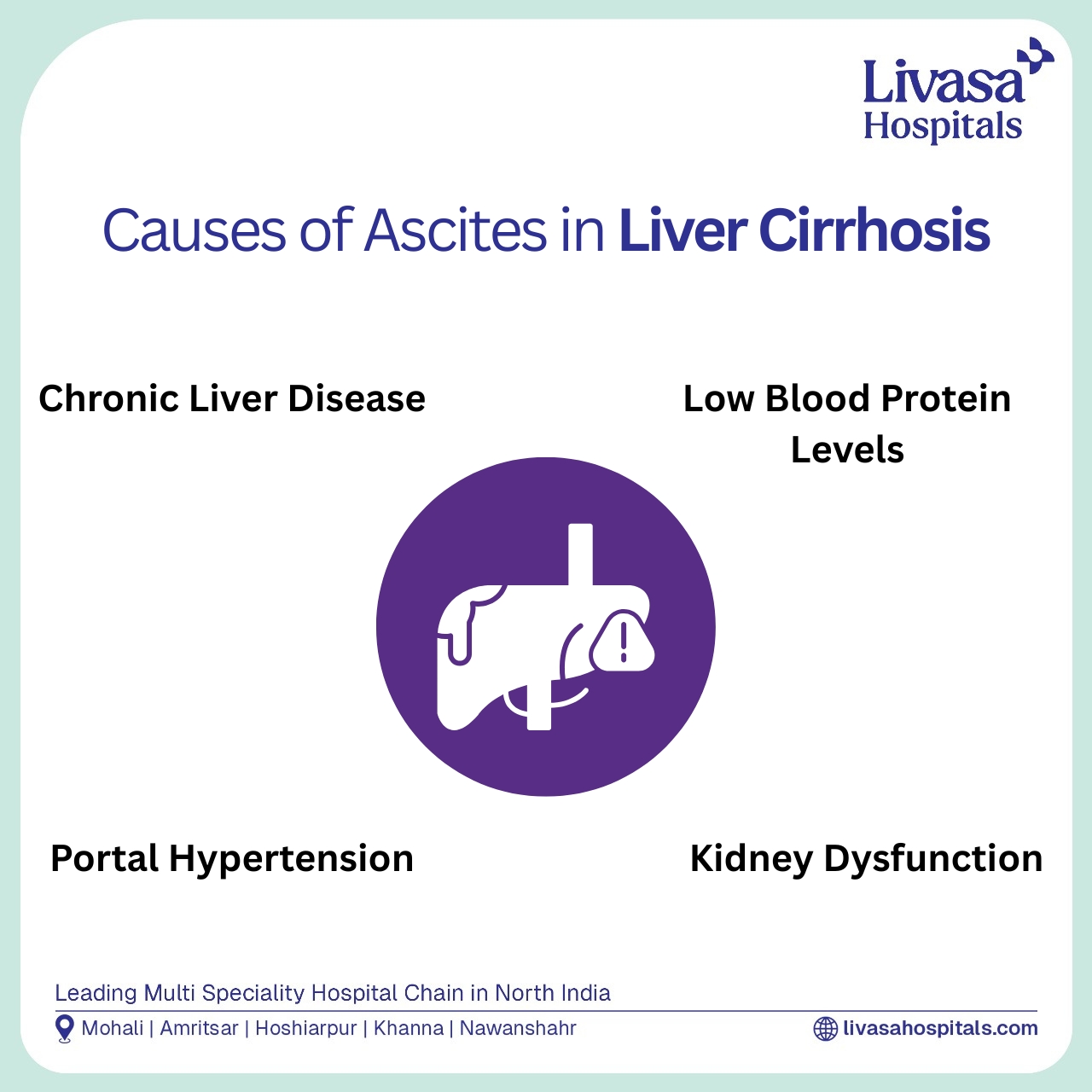19 Dec 2025
Age Specific Related to Psoriasis in Amritsar


Dr. (Prof) Arunanshu Behera
22 May 2025
Call +91 80788 80788 to request an appointment.
Ascites, a condition characterized by the accumulation of fluid in the abdominal cavity, is a common complication of liver cirrhosis. This condition can signify advanced liver disease and requires careful evaluation and management. As a crucial aspect of gastroenterology, understanding ascites in liver cirrhosis is vital for both patients and healthcare professionals. If you or a loved one are facing this health challenge, it’s essential to navigate the diagnostic and treatment pathways effectively.
Liver cirrhosis can result from various underlying conditions, including chronic hepatitis, alcohol abuse, and fatty liver disease, leading to progressive liver damage and impaired function. As the liver’s functionality declines, the portal vein pressure rises, prompting fluid leakage into the abdominal cavity. This fluid accumulation can lead to discomfort, difficulty breathing, and several complications if not managed appropriately.
Ascites occurs due to the combination of increased portal hypertension and decreased albumin levels, a protein produced by the liver that helps retain fluid within the bloodstream. When liver cirrhosis progresses, the liver's ability to synthesize albumin diminishes, allowing excess fluid to seep into the abdominal cavity. Additionally, imbalances in hormone levels related to fluid regulation can exacerbate this condition.
Ascites can be classified into two main types:
Understanding the type of ascites present is critical in determining the appropriate management to pursue, as the treatment strategies can differ significantly.

Ascites primarily results from cirrhosis, but several underlying factors can contribute to its development. Key causes include:
Understanding these causative factors is critical for developing tailored treatment strategies at Livasa Hospitals in Punjab, where our gastroenterology team is dedicated to providing comprehensive care for patients with liver conditions, including ascites.
The presence of ascites can cause a range of symptoms varying in severity. Common symptoms include:
It’s crucial for individuals experiencing these symptoms to seek medical advice promptly. Diagnosing ascites early can help prevent complications and improve overall management of liver cirrhosis.
Diagnosing ascites typically begins with a thorough clinical evaluation. At Livasa Hospitals in Punjab, our gastroenterology specialists utilize several diagnostic methods:
In conjunction with these diagnostic steps, our specialists also evaluate liver function through blood tests and imaging studies to determine the extent of cirrhosis and develop a personalized treatment plan.
Treating ascites in liver cirrhosis involves various strategies tailored to the individual patient's condition. Options may include:
The treatment approach will largely depend on the severity of the cirrhosis and the patient's overall health. At Livasa Hospitals, we provide the best gastroenterology care in Punjab, ensuring that your treatment plan is holistic and effective.
Ascites drainage, specifically paracentesis, is a critical procedure in managing severe ascites. It is typically performed under sterile conditions, using either local anesthesia or conscious sedation to ensure comfort for the patient. This procedure can be beneficial for several reasons:
The team at Livasa Hospitals employs advanced techniques for ascites drainage and is committed to ensuring the safety and efficacy of the procedure. Following drainage, patients are closely monitored for any immediate complications.
Diuretics are considered a first-line treatment for managing mild to moderate ascites in cirrhosis patients. Spironolactone, a potassium-sparing diuretic, is frequently prescribed due to its effectiveness in promoting sodium and water excretion without causing significant potassium loss. Other diuretics, such as furosemide, may also be administered in conjunction to enhance fluid removal. The main benefits include:
It's vital for patients to consult with their healthcare provider to tailor diuretic use based on their individual health status and response to treatment.
Effective management of ascites extends beyond immediate symptom relief and involves a comprehensive approach to the underlying liver disease. Key strategies include:
At Livasa Hospitals, our gastroenterology team emphasizes personalized care plans tailored to each patient's needs, focusing on both their physical and emotional health throughout their treatment journey.
Ascites in liver cirrhosis represents a complex challenge requiring effective diagnostic and therapeutic strategies. Understanding the causes, symptoms, and treatments of ascites can empower patients and families to make informed decisions regarding their health.
Regular follow-up, timely management of complications, and lifestyle modifications can significantly improve the quality of life for individuals with ascites. It is crucial not to navigate this journey alone; partnering with experienced specialists at Livasa Hospitals in Punjab ensures access to comprehensive care for liver conditions, including cirrhosis and ascites.
Early detection and proactive management can dramatically enhance your health outcomes. Book an appointment at Livasa Hospitals today or talk to our specialists for comprehensive care and guidance regarding ascites and liver cirrhosis.
+91 80788 80788
Livasa Healthcare Group Corporate Office,Phase-8, Industrial Area, Sector 73, Sahibzada Ajit Singh Nagar, Punjab 160071
livasacare@livasahospitals.in
| Mohali | +91-99888 23456 |
| Amritsar | +91-99887 49494 |
| Hoshiarpur | +91-99883 35353 |
| Nawanshahr | +91-75081 82337 |
| Khanna | +91-98888 05394 |